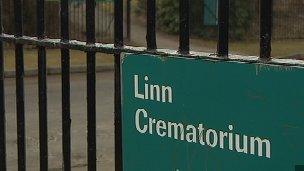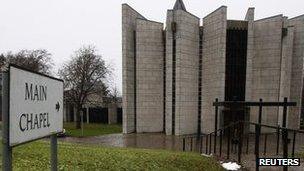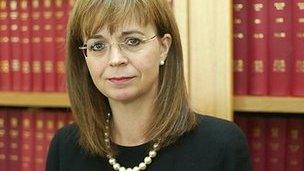Baby ashes scandal widens to Glasgow
- Published
BBC Scotland has uncovered evidence implicating Scotland's biggest council in the baby ashes scandal.
BBC Scotland has uncovered evidence implicating Scotland's biggest council in the baby ashes scandal.
In December it emerged that Edinburgh's Mortonhall Crematorium had secretly buried babies' ashes for decades.
Last week, a BBC Scotland investigation revealed that Aberdeen did not return ashes for babies up to 18 months old.
It has now emerged that at least two babies' ashes were disposed of secretly in Glasgow. But Co-op Funeralcare said it was not asked to return the ashes.
In Edinburgh, grieving parents had been told by Mortonhall Crematorium that there would be no remains from the cremation of their baby, only to find out that ashes had been buried behind their backs.
And last week, the BBC revealed that whether parents received ashes from their babies' cremations depended almost entirely on where they lived. This was based on a series of Freedom of Information (FoI) requests submitted to every council which ran crematoriums about the number of times over the past five years they returned ashes to parents.
Most gave full answers, however Glasgow City Council refused to respond, saying that even although they held the information, they had not collated it and were therefore unable to provide it.
After last week's programme, the BBC was contacted by the O'Rourke family, whose daughter Maeve was stillborn in 2009.
The family chose cremation at Glasgow's Linn Crematorium, but like the Mortonhall parents, they say that they were told by the funeral director that there would be no ashes.
Cairsty O'Rourke told the BBC: "A couple of days after the birth, my husband went down to the funeral directors to hand in the stillbirth certificate and at that point he asked how we arrange to get her ashes back. And we were told by them that there aren't any ashes in these cases.
"My husband came back and told me, and it just floored me.
"I know it might sound ridiculous, but you leave in these circumstances feeling that your arms are very empty and you want everything, everything linked to that baby. And her ashes would've been an extremely important part of that. It would've been her."
Cairsty had always been suspicious about Maeve's cremation, and decided to ask Glasgow City Council about it, after the Mortonhall scandal emerged.
She discovered there had in fact been ashes for Maeve and they had been scattered without her knowledge.
She said: "I heard about it (Mortonhall) in January. And it was just with a feeling of panic and dread, that perhaps this had happened to us too, and actually there may have been ashes and they just hadn't been returned to us - they'd been denied to us.
"At that point we realised we'd have to investigate and find out what happened and where she was.

Cairsty O'Rourke asked Glasgow's council about her baby's ashes after the Mortonhall scandal emerged
"My husband contacted the council, the Linn Crematorium, where she'd been cremated, to find out if there had been any ashes.
"And they emailed back to say there were and she had been scattered at Linn Crematorium, as per the applicant's instructions.
"I was just so upset to hear that. To hear that some stranger, who she meant nothing to, had scattered her, as if she was unwanted or abandoned, was deeply upsetting. And for them to say that it was me as the applicant, who'd instructed that, was very hard to bear."
Just hours after the birth, Cairsty had to fill in the council's cremation form. She signed it, agreeing to the cremation. But she insists she was never shown, and did not sign the reverse of the form saying Maeve's ashes should be scattered. That part was signed by the Co-operative's funeral director.
Questions have now been raised about just how many more babies like Maeve have been cremated in Glasgow, and whose ashes have been disposed of in secret.
After being interviewed by the BBC on Thursday, Glasgow City Council said it has reconsidered its decision not to answer the BBC's Freedom of Information request.
More than 2,300 babies have been cremated in the city since 1997. The council confirmed that 19 families had inquired about their baby's ashes since the scandal broke, and that two of those, including the O'Rourke's, appeared to have had ashes dispersed without the consent of the parents.
The council's head of communications, Colin Edgar, in an interview with the BBC, apologised to the O'Rourke family, and said the form completed by bereaved parents would be changed.
He said: "The statutory part of the form requires a signature by the applicant, which is the bereaved parent. The part where the instructions are given requires a signature by the funeral director.
"Now, in light of this case and other cases, we will look at it as something we could change."
He said the council followed the instructions it was given in the O'Rourke case.
"We had no reason to believe that the instruction we were given by the funeral director was anything other than the wishes of the parents," he said.
"It's mystifying as to why the two would've been different."
A spokesperson for the Co-operative Funeralcare, said: "Any death, particularly that of a pre-term or young baby is a tragedy and needs sensitivity from everyone involved.

Babies ashes had been buried in a mass grave at Edinburgh's Mortonhall Crematorium
"In August 2009 we received instructions from our client, the Southern General Hospital in Glasgow, to arrange the cremation of Baby O'Rourke. The instructions from the hospital made no request for the ashes to be returned and they were scattered in the garden of remembrance at the Linn Crematorium where the cremation was carried out.
"When a client requests the return of ashes of a stillborn child we would consult the crematorium concerned to see if this were possible and advise accordingly.
"We met with the family earlier this year to listen to their concerns and we explained the facts of the case as we understand them."
In a statement, NHS Greater Glasgow and Clyde said: "As we indicated to Mrs O'Rourke, the responsibility for the cremation and return of ashes lies with funeral directors.
"NHSGGC is guided by funeral directors as to the availability of ashes following the cremation of stillborn babies.
Up until recently the guidance was that no ashes were available following cremation. However following our investigations into the complaint by Mrs O'Rourke, we have now received new advice that some crematoria will return ashes which may include the remains of the baby.
"As a result of this we have now reviewed all the information that we provide to families at this distressing time and have reflected this new advice."
'Public inquiry'
Nicola Sturgeon, the MSP for Glasgow Southside, called on the city council to launch independent review, as has been done in Edinburgh.
She said: "I believe that my constituents deserve answers to the legitimate questions that they have - questions relating to the practice of telling bereaved parents that there would be no ashes following cremation, even when it is now clear that this was not always the case; the procedures that were - or were not - in place to ensure that parents were given accurate information and that their wishes were ascertained and respected; and the paperwork used to record parents' wishes.
"I have raised these issues with Glasgow City Council on behalf of my constituents. The initial response received does not yet answer their questions to their satisfaction and I will therefore continue to pursue the matter with relevant parties on their behalf.

Dame Elish Angiolini will lead an investigation into what happened at Mortonhall
"However, given the seriousness of the issues involved - and the uncertainty around the number of parents in Glasgow who may have had a similar experience to my constituents - I believe that Glasgow City Council should follow the example of City of Edinburgh and order an independent review.
"In their response to my letter - which asked if they would order an independent review either on a stand alone basis or by asking Dame Elish Angiolini to widen the scope of the inquiry that she will undertake at the request of the City Of Edinburgh - Glasgow City Council said that it had no plans to do so at this time but that they were keeping the matter under review."
Meanwhile, Willie Reid, chair of the Mortonhall Ashes Action Committee, said the planned inquiry into the Mortonhall scandal by Dame Elish Angiolini should be abandoned, and replaced by a public inquiry.
He said: "That's Scotland's three biggest cities, Edinburgh, Aberdeen and now Glasgow involved in this. This is now too big a scandal for the inquiry to be confined to Edinburgh council.
"The only way that parents, across Scotland, are going to get the answers they deserve is through a full public inquiry."
'No remains'
Meanwhile in Aberdeen, BBC Scotland last week revealed that Hazlehead Crematorium had failed to produce ashes in any of its 24 cremation babies up to six months old. In various correspondence with Aberdeen council over three months, it had forcefully maintained that "there are no remains" from a baby up to 18 months.
But just hours after the BBC story was published, the council announced it had launched an independent audit into its cremation practices.
When asked which company was doing the independent audit, but the council refused to tell us, saying the identity of the company was "not the issue. The important point is that it is an independent audit."
The council then told the BBC that the audit had actually been ordered in January, and had commenced in March. When the BBC asked for an interview about why Aberdeen had not previously told us about the audit, it declined, and said the results would be made public in due course.
- Published3 April 2013
- Published3 April 2013
- Published22 January 2013
- Published11 January 2013
- Published10 January 2013
- Published9 January 2013
- Published9 January 2013
- Published5 December 2012